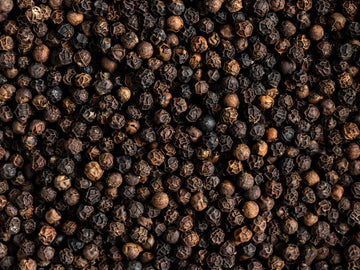Apigenin is a flavonoid, which are chemicals found all over the plant kingdom that provide fruits, vegetables, and flowers their color. Flavonoids are broken down by the body to benefit us; they provide antioxidant and anti-inflammatory benefits. Apigenin is a yellow crystalline solid that has historically been used to dye wool. Recently, apigenin has increased in popularity due to research and endorsement by figures such as Andrew Huberman as well as being popular on Reddit and other health focused communities.
Apigenin is commonly extracted from the chamomile plant (Matricaria recutita L), which is a member of the daisy (Asteraceae) family. Chamomile is by far the most apigenin-abundant plant, with it making up 68% of the total flavonoids and around 1% of total content. Matricaria chamomilla is native to southern and eastern Europe. Chamomile comes from the Greek "chamaimēlon" meaning "earth-apple" which is in reference to its apple-like scent. Chamomile has been used for thousands of years dating back to ancient Romans, Greeks, and Egyptians with it thought to be first used for medical purposes in 1550 BC.
How does Apigenin Help with Anxiety?
Apigenin helps with anxiety primarily through its interaction with the GABA system in the brain, but also through its anti-inflammatory effects, antioxidant properties, and cortisol regulation.
GABA Receptor Modulation
What is GABA and how does it reduce anxiety?
GABA or gamma-aminobutyric acid is a neurotransmitter (helps transmit signals in the brain) that stimulates relaxation by lowering the amount of activity and excitability of neurons it binds to in the brain; it slows things down. High neural activity causes things like restlessness, stress, and anxiety. Many anti-anxiety medications such as benzodiazepines like Xanax work by increasing the effect of GABA.
How does apigenin affect the GABA system?
Apigenin has been shown to bind to the benzodiazepine site on the GABA-A receptor complex. By binding to the site, apigenin acts as a positive allosteric modulator. This means that it does not directly activate the receptor but rather enhances the probability that GABA binds to the receptor. As more GABA binds to receptor sites in the brain, the inhibitory effect increases, leading to a calming effect on the nervous system and reducing anxiety [1]
Anti-Inflammatory Effects
Chronic inflammation is linked to anxiety and other mood disorders. Apigenin has anti-inflammatory properties that can help reduce inflammation in the brain, potentially alleviating anxiety symptoms. Apigenin has been shown to create an anti-inflammatory effect through a few difference mechanisms.
- The first is through the inhibition of pro-inflammatory cytokines. Cytokines are small proteins released by cells that play a crucial role in cell signaling and can promote inflammation. Apigenin inhibits the production on these cytokines which lowers inflammation in the body and brain [2].
- Apigenin has also been shown to reduce NF-κB activity, a protein complex that plays a key role in regulating immune response to infection. Apigenin can inhibit the activation of NF-κB, thereby reducing the expression of genes involved in the inflammatory response. This reduction in NF-κB activity helps decrease overall inflammation [3].
-
COX-2 is an enzyme that is involved in the production of pro-inflammatory prostaglandins. Apigenin has been shown to inhibit the activity of COX-2 and results support that use of apigenin is beneficial in the treatment of acute lung injury [3]
-
Lastly like many flavonoids, apigenin has strong antioxidant properties, allowing it to neutralize free radicals and reduce oxidative stress. This, in turn, helps lower inflammation and protect brain cells from damage [4].
Cortisol Regulation
Cortisol is a steroid hormone produced by the adrenal glands in response to stress and other bodily functions such as metabolism, inflammation, and the sleep-wake cycle. It is commonly referred to as the "stress hormone" because it is the main hormone in the stress response.
When a person experiences stress, the hypothalamic-pituitary-adrenal (HPA) axis is activated which triggers a cascading release of hormones from the hypothalamus and pituitary glands called corticotropin-releasing hormone (CRH) and adrenocorticotropic hormone (ACTH). These hormones prompt the adrenal glands to produce cortisol. Elevated cortisol produces the nasty physical symptoms of anxiety and stress like elevated heart rate through the fight or flight response, increased blood pressure, sweating, rapid breathing, nausea etc...
Apigenin is known to inhibit an enzyme called 11β-HSD1 which converts inactive cortisone to active cortisol in tissues. By inhibiting the enzyme, apigenin reduces systemic levels of cortisol. Additionally, apigenin may downregulate the activity of the HPA axis by reducing CRH and ACTH, thereby diminishing the release of cortisol and the consequent stress response.
Is Apigenin Effective in Reducing Anxiety and Stress?
There are numerous positive human studies looking into the anxiolytic (anti-anxiety) effects of chamomile, however only a few studies looking directly at apigenin.
In a double-blind randomized long-term clinical trial with 179 participants, subjects were given 500mg of chamomile extract three times daily or a placebo. The study found that chamomile group maintained significantly lower generalized anxiety symptoms than the placebo group [5].
In a study on mice, apigenin had clear anxiolytic activity without evidence of sedation or muscle relaxant effects seen in use of classical benzodiazepines [6].
In another study, human adrenocortical cells were exposed to apigenin and other flavonoids in vitro, and found that cortisol production decreased by 47% compared to control cells [7].
A study determining apigenin's effects on inflammation in the brain found that apigenin preserved neuron integrity, had a neuroprotective effect against inflammatory damage, reduced microglial activation (immune cells), and decreased the expression of the M1 inflammatory marker CD68 [8].
Is Apigenin Effective in Improving Sleep?
A reduction in anxiety and stress provides a positive indirect effect on sleep making it easier to fall asleep and stay asleep. In an Italian study testing the association between apigenin and other flavonoids and sleep found that higher intake of flavonoids, especially, apigenin was associated with better sleep quality [9].
How to Take Apigenin?
When should you take apigenin?
Apigenin can be taken anytime day or night, it is personal preference. Apigenin has a well-documented sedative effect so many would find it unsuitable for day time use.
Should you take apigenin with food?
Apigenin can be taken with or without food. Very few users may find it leads to mild stomach discomfort so they take it after a meal or small snack.
What dose of apigenin should you take?
Apigenin reddit users have claimed that around 50mg of apigenin works well for an average sized person in reducing anxiety and improving sleep. Andrew Huberman, also includes apigenin as part of his sleep cocktail and recommends 50mg.
How long does it take to feel apigenin?
Apigenin's effects should be felt within 30 to 60 mins of ingestion. Effects will come on faster if taken on an empty stomach and will be slower if taken with food, and especially a high protein meal.
References
- Wasowski C, Marder M. Flavonoids as GABAA receptor ligands: the whole story? J Exp Pharmacol. 2012 Feb 23;4:9-24. doi: 10.2147/JEP.S23105. PMID: 27186113; PMCID: PMC4863311.
- Yoon JH, Kim MY, Cho JY. Apigenin: A Therapeutic Agent for Treatment of Skin Inflammatory Diseases and Cancer. Int J Mol Sci. 2023 Jan 12;24(2):1498. doi: 10.3390/ijms24021498. PMID: 36675015; PMCID: PMC9861958.
- Wang, J., Liu, YT., Xiao, L. et al. Anti-Inflammatory Effects of Apigenin in Lipopolysaccharide-Induced Inflammatory in Acute Lung Injury by Suppressing COX-2 and NF-kB Pathway. Inflammation 37, 2085–2090 (2014). https://doi.org/10.1007/s10753-014-9942-x
- Kashyap P, Shikha D, Thakur M, Aneja A. Functionality of apigenin as a potent antioxidant with emphasis on bioavailability, metabolism, action mechanism and in vitro and in vivo studies: A review. J Food Biochem. 2022 Apr;46(4):e13950. doi: 10.1111/jfbc.13950. Epub 2021 Sep 26. PMID: 34569073.
- Mao JJ, Xie SX, Keefe JR, Soeller I, Li QS, Amsterdam JD. Long-term chamomile (Matricaria chamomilla L.) treatment for generalized anxiety disorder: A randomized clinical trial. Phytomedicine. 2016 Dec 15;23(14):1735-1742. doi: 10.1016/j.phymed.2016.10.012. Epub 2016 Oct 24. PMID: 27912875; PMCID: PMC5646235.
- Viola H, Wasowski C, Levi de Stein M, Wolfman C, Silveira R, Dajas F, Medina JH, Paladini AC. Apigenin, a component of Matricaria recutita flowers, is a central benzodiazepine receptors-ligand with anxiolytic effects. Planta Med. 1995 Jun;61(3):213-6. doi: 10.1055/s-2006-958058. PMID: 7617761.
- Ohno S, Shinoda S, Toyoshima S, Nakazawa H, Makino T, Nakajin S. Effects of flavonoid phytochemicals on cortisol production and on activities of steroidogenic enzymes in human adrenocortical H295R cells. J Steroid Biochem Mol Biol. 2002 Mar;80(3):355-63. doi: 10.1016/s0960-0760(02)00021-3. PMID: 11948020.
- Dourado NS, Souza CDS, de Almeida MMA, Bispo da Silva A, Dos Santos BL, Silva VDA, De Assis AM, da Silva JS, Souza DO, Costa MFD, Butt AM, Costa SL. Neuroimmunomodulatory and Neuroprotective Effects of the Flavonoid Apigenin in in vitro Models of Neuroinflammation Associated With Alzheimer's Disease. Front Aging Neurosci. 2020 May 15;12:119. doi: 10.3389/fnagi.2020.00119. PMID: 32499693; PMCID: PMC7243840.
- Godos J, Ferri R, Castellano S, Angelino D, Mena P, Del Rio D, Caraci F, Galvano F, Grosso G. Specific Dietary (Poly)phenols Are Associated with Sleep Quality in a Cohort of Italian Adults. Nutrients. 2020 Apr 26;12(5):1226. doi: 10.3390/nu12051226. PMID: 32357534; PMCID: PMC7282005.




